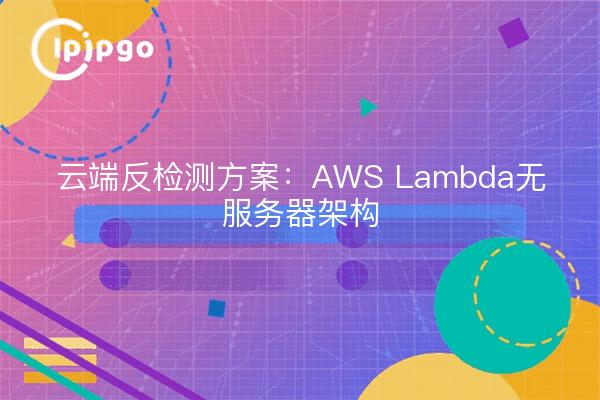
When crawlers meet CAPTCHA: Why is your IP always recognized?
Friends who have done data collection know how perverse the anti-climbing mechanism of the website is now. Yesterday, the script can run normally, today suddenly be blocked IP, jump CAPTCHA are considered light, serious direct account blocking. Traditional programs either use a fixed server to rotate IP, but the operation and maintenance costs are too high to scare; either buy a shared proxy on the market, the result is that the IP pool is full of other people with bad dirty IP.
Here's a counterintuitive discovery:IPs are blocked not only because of the frequency of visits, but also because of behavioral characteristics identified by machine learning models. Just as humans can recognize acquaintances by their walking posture, website risk control systems analyze mouse tracks, request intervals, SSL fingerprints, and more than 20 other dimensions. At this time, if you use AWS Lambda, a serverless architecture, with ipipgo's dynamic residential IP, you can play a tawdry operation.
The golden combination of Lambda + Proxy IP
Let's be clear about how this scenario works.AWS Lambda assigns new IPs every time it performs a task, but the problem is that these IP segments have long been marked as cloud IPs by major websites.That's where things like ipipgo come in.Real Estate Agentsto play the match:
| Traditional Programs | Lambda+ipipgo program |
|---|---|
| Fixed Server IP | Automatic IP change per request |
| Manual switching of proxies | The program automatically calls the API |
| High IP reuse | Residential IP burns out |
Specifically, the crawler is broken down into multiple microfunctions. When each Lambda instance starts, it obtains an exclusive proxy through the API of ipipgo, and the lifecycle of a single IP is controlled in 3-5 minutes. This has two benefits: it avoids overheating IPs and utilizes Lambda's automatic expansion and contraction to cope with unexpected traffic.
A practical guide to avoiding the pit
Never just buy an off-the-shelf proxy service and slap it into Lambda, here are a couple of lessons learned the hard way:
1. Conversation keeping is critical: Some sites need to stay in session, so it's important to keep the Lambda function and the ipipgo proxy bound for at least 10 minutes, and their long-time connection feature comes in handy!
2. Don't jump the gun on geography.: Using a US IP in the morning to cut Japan in the afternoon, any fool knows there is a problem. Suggest locking ipipgo to a specific city node based on task type during Lambda initialization
3. TLS Fingerprint Camouflage: Lambda's default TLS fingerprinting is easy to recognize, remember to use a customized runtime environment with the browser fingerprinting template provided by ipipgo
3 Questions You Might Ask
Q: Lambda has a free quota, will it go over budget?
A: The cost of a million requests is less than $50 per month, which is much cheaper than maintaining a server. ipipgo's per-use billing model is a perfect match for Lambda, so you can use as much as you want.
Q: Will residential agents be slow?
A: It is tested that the delay can be controlled within 200ms by ipipgo optimized transit nodes. The key is to turn on their intelligent routing function to automatically avoid congested routes
Q: Is there much change to the existing crawler code?
A: The main modification point in the IP call module, the original proxy configuration replaced by ipipgo API interface. They provide ready-made SDK, 20 lines of code can be done to integrate the
Why ipipgo?
There are a lot of proxy service providers on the market, but not many of them are suitable for serverless architecture. ipipgo has three brushes that are particularly flavorful:
- Dynamic residential pool: Real home broadband in 85 countries, with fresh unused IPs every time you get it!
- Zero-configuration access: The API returns ready-to-use proxy strings, which can be thrown directly to the requests library.
- abnormal melting mechanism: When an IP triggers CAPTCHA, the system automatically fuses and replenishes the new IP.
They recently went live withLambda Dedicated ChannelIt also reduces the delay of API calls by pre-generating proxy pools. The actual test in the double eleven rush data collection, 48 consecutive hours of zero blocking, save 3 programmer labor costs.
The most tawdry thing about this solution is that it enjoys the elasticity and scalability of a serverless architecture while maintaining the behavioral characteristics of real users. The next time you encounter a perverted CAPTCHA, try this combo and you might be pleasantly surprised (of course don't come to me if you get blocked, the dog's head protects your life).








